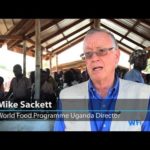Serious hunger and malnutrition loom for millions of refugees across Eastern Africa who depend on assistance from the United Nations World Food Programme (WFP) to survive, as the socio-economic impact of the COVID-19 pandemic reduces vital funding from donors.
WFP has already been forced to reduce food or cash transfers by between 10 to 30 percent for over 2.7 million refugees in Ethiopia, Uganda, Kenya, South Sudan, and Djibouti. WFP will be forced to cut deeper in the coming months unless urgent additional funding is received in time.
“Refugees are especially vulnerable to the spread of COVID-19 because they are crowded together in camps with weak or inadequate shelter, health services and access to clean water and sanitation,” said WFP Eastern Africa Regional Director Michael Dunford.
Refugees are also affected both by the wider socio-economic impact of the pandemic as well as by the disease itself. The most vulnerable women, children and elderly are increasingly at risk of becoming malnourished, which can in turn impact their immune systems and increase their risk of being infected by disease, a tragic vicious cycle in the midst of a pandemic.
“With COVID yet to peak in East Africa, we cannot turn our backs on people forced to flee and stuck in remote camps,” Dunford added. “Many have already lost the few opportunities to earn money due to the economic downturn caused by COVID-19 restrictions.”
WFP requires US$ 323 million to assist refugees in the region over the next six months – this is 22 percent greater than during the same period a year earlier.
COVID-19 restrictions closed schools in refugee camps, meaning that children missed out on vital school meals in Ethiopia, Kenya, South Sudan, Rwanda and Uganda. In all these countries except in Rwanda, funding shortages meant that WFP was unable to provide take home rations to refugee children to help them study at home and stay nourished.
Extended school closures can lead to increased teenage pregnancies, sexual abuse, early marriage, violence at home, child labour and high school dropouts. They threaten to erode hard-won gains made over the years to improve access to quality schooling for refugees in camps.
Women and girl refugees are also at heightened risk of gender-based violence, sexual exploitation and abuse, in addition to resorting to having sex for payment in order to survive. People with disabilities and unaccompanied or separated children are the most vulnerable.
“Sadly, it is the poorest and most disadvantaged who suffer the most,” said Dunford. “But we simply cannot let this happen. COVID-19 cannot be an excuse for the world to turn its back on refugees at this terrible time.”
The situation is so serious for refugees that WFP is appealing both to traditional donors and new would-be donors, such as International Financial Institutions (IFIs), to step forward and assist refugees – precisely because their vulnerability only increased with COVID-19. Donors such as the World Bank have stepped up to support governments in the region to assist poor people living in informal settlements in urban areas after millions lost their livelihoods due to the economic downturns triggered by COVID-19 restrictions.
If WFP is forced to continue cutting rations for refugees, this could prompt refugee communities to move within host countries or even across borders as they become more desperate to meet their basic needs. Such movements could not come at a worse time with the coronavirus spreading.
WFP lauds governments in the region for continuing to host refugees and largely keeping borders open.








